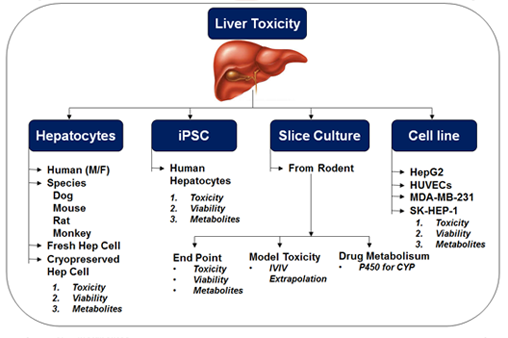IN VITRO
In Vitro preclinical toxicology studies
The use of tissue culture provide a valuable solution to address study problems of clinical relevance, especially those related to diseases, screening, and studies of cell toxicity mechanisms. In vitro tests of toxicity are beneficial for drug development because of cost, speed, studies of mechanisms, and studies utilizing human cells and tissues.
We are proud to introduce the in vitro organotypic slice culture (also known as organ culture) model for determination of toxicity of compounds. The advantages of the model is that the system represents
Presence of all cell types without any disturbance of natural milieu; Duration-dose dependent changes can be studied (ability to study changes for 14 days or more; not possible with cell lines); Ability to track the cellular changes in real time and derive a dose-response curve.
Organ culture is a step closer to use of the actual living animal, as it consists of multicellular tissue supported by stromal elements. At present, we do offer organotypic slice cultures derived from rat pups (post-natal day 7-10) and also from young adult rats. The slices are viable for more than a month following a 7-14 day maturation period. End points to be studied will be custom designed depending on the client requirements.
Most common studies in slice cultures we provide include
- Viability and Cytotoxicity
- Cell signaling and communication
- Invasion and motility
- Tissue regeneration
The US Food and Drug Administration (FDA) published the draft guidance in February, 2012 whose suggestions include recommendations for sponsors of new drug applications (NDAs) and biologics license applications (BLAs) regarding in vitro and in vivo studies of drug metabolism, drug transport, and drug-drug or drug-therapeutic protein interactions. The main focus of this guidance is for pharmacokinetic drug interactions. It is more common that patient may take several other drugs for treatment of multiple diseases and eventually these drugs altered the pharmacokinetic and pharmacodynamic behavior of drug of interest.
Drik provide in vitro drug-drug interaction testing solutions to support pharmaceutical drug discovery and development programs. Drug metabolizing enzymes (DME) are a diverse group of enzymes located primarily in the liver. Drugs, chemicals, and other phytochemicals interact with living systems through chemical processes, especially by binding to regulatory molecules and activating or inhibiting normal body processes. Most of these active ingredients are metabolize and detoxify by liver enzyme, which is a major cause of low bioavailability. It is very important to obtain drug metabolism data at early stage. It can be possible only by invitro culture. As a part of ADME services we provide enzyme induction and enzyme inhibition by drug molecules in invitro system. We provide these services in slice culture, pooled liver microsomes, S9 fraction and hepatocytes.
Most common service we provide as follows
- Cytochrome P450 and CYP isoform expression against drug and other inhibitors
- Investigate drug metabolites
- Metabolic Stability – microsomes, S9, plasma/blood
- Metabolite profiling and identification – CYP inhibition
- Reversible and time dependent CYP induction
- 3D Slices
Drug screening is a long and costly process. It is big challenge in using animals as model to confirm with low productivity. It limits the discovery of new drugs. To reduce the number of animals in tests and to accelerate drug discovery process, recent efforts have been dedicated to developing cell-based high throughput screening. It helps to improve and fasten the drug screening process. It provides more relevant to in vivo biological information. The data obtained from tissue culture help pharma industry to determine potential efficacy and safety (e.g., predictive toxicity) of drug candidates. In vitro cell culture also provides information about morphology and cellular functions such as cell-cycle status, health and viability, and cell signaling pathways in drug discovery. We provide these services as per the industry requirement.
Most common service we provide in the cell lines are
- Cell viability
- Cell cytotoxicity
- Apotosis assay (Caspase 2,3,6,7,8 and 9 assay)
- Cancer research
Stem cells are distinct self-replenishing cell population whose primary function is to generate progeny that develop into terminally differentiated cell types, such as a cardiomyocytes, neurons or receptors. This ability of cells known as “pluripotency” is a hallmark of embryonic stem cells (ESCs). Stem cells belong to one of two major categories according to their potency of differentiation: organ-specific stem cells and pluripotent stem cells. Organ-specific stem cells generally have limited potential for growth and differentiation. In contrast, pluripotent stem cells, such as ESCs and induced pluripotent stem cells (iPSCs) replicate in culture dishes and are theoretically capable of giving rise to any of the cell types found in the body.
Most of the drug fails at preclinical stage because of liver toxicity and alterations of hepatic physiology. In addition, drug-induced liver injury is the most common reason for market withdrawal of approved drugs due to safety concerns. It is really difficult to predict liver toxicity because lack of biologically relevant and predictive model systems. Stem cells of hepatocytes will overcome these limitations and provide well-characterized, highly reproducible, and readily available human hepatocytes for preclinical drug development and safety testing.
Drik provide services for human induced pluripotent stem cell-derived cardiomyocytes and hepatocytes. These human cardiac and hepatocytes cells are specifically designed to aid drug discovery and improve the predictability against structurally diverse drugs. They help researchers to better understand and optimize the predictive algorithm for applications in discovery toxicology, cardiac and liver safety screening. We obtained these iPSC from reliable source of well-characterized, highly reproducible, and readily available for preclinical drug development and safety testing.
To understand mechanism of action, the following assay end points are offered by Drik:
Cell viability
- MTT
- Neutral red
- LDH
- Cell death
- Propidium iodide
- Fluorojade B
- CYP inhibition; DDI
- Mitochondrail toxicity
- Phospholipidosis; Steatosis
- Apoptosis (Casp3/7/8/9), BrDU
- Autophagy
- Necrosis
- GSH; Oxygen radical absorbance
- Screening panel






